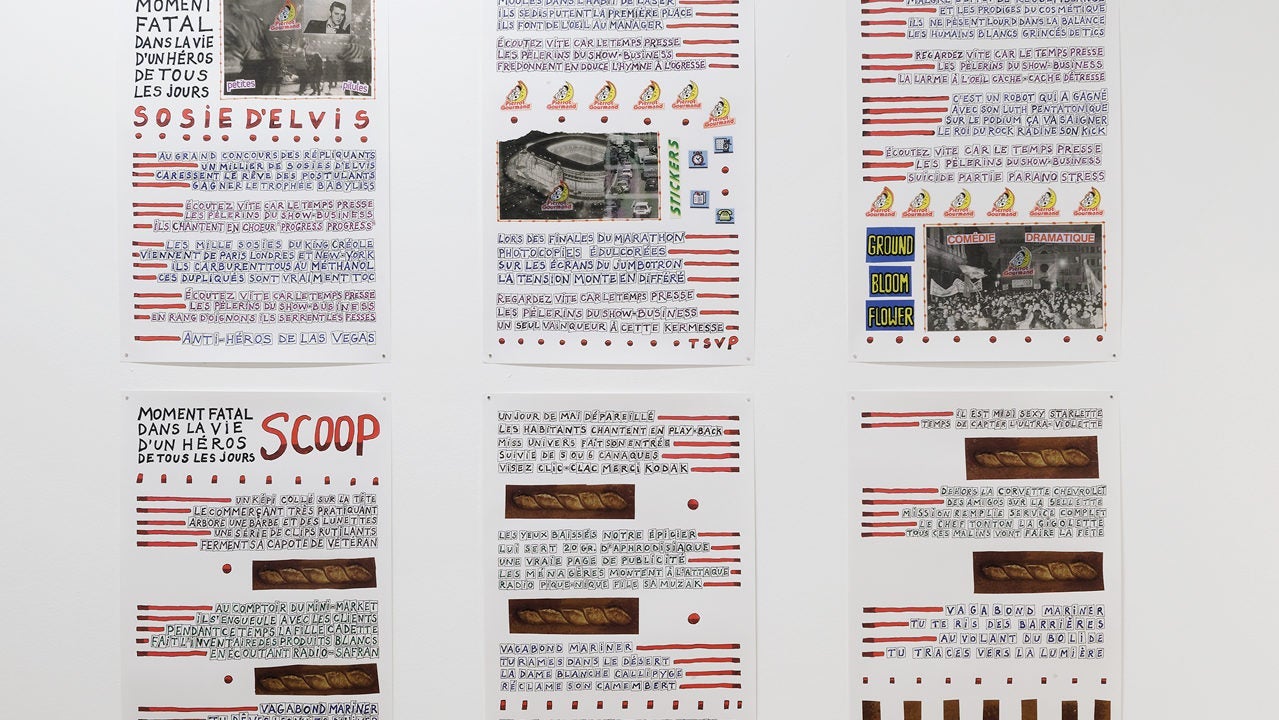Joëlle de la Casinière
Anne Bonnin is welcoming Joëlle de la Casinière.
Listen to the lecture on France Culture !
We are welcoming Joëlle de La Casinière, who is presenting several works in the group exhibition Poésie prolétaire conceived by curator François Piron: all of her books, the short film So Happy, and pages from an opera booklet she created with musician Jacques Lederlin (Que será será, 2019), who will be in attendance. This evening event will offer a chance to discover the artist’s films and videos, as well as her nomadic artistic path.
The artist began creating films in 1970 in Peru, with director Carlos Ferrand. From 1970 to 1975, she made many very long trips to Latin America, particularly to Peru, where she shot several Super 8 and 16mm films with Michel Bonnemaison. The country was then being ruled by an authoritarian regime, but it was a progressive and Third-Worldist one that planned major reforms benefitting the poor, particularly land reforms. The film Rose de Lima reveals a large desert squat—which has become a city called Villa El Salvador, near Lima—as it builds itself and organises its subsistence resources and schooling according to a self-management model. Villa El Salvadore still exists, constituting a successful model of a communitarian city. The film Suite (1975) shows a street mechanic working in Lima. There is no explanatory voiceover accompanying the images. And although these constitute documents, they do not fall under the documentary genre. La Casinière’s films represent a type of cinematic expression that seeks images and viewpoints that are accurate and have the right distance.
Punctuated by films from the 1970s and videos from the 1980s, our interview will enable us to explore Joëlle de la Casinière’s various types of work : films, books, tablotins and videos, showing their specificities and the links that unite them. Her works (with the exception of the films) are products of graphic poetry: they interweave text and image, creating a sort of between-there, an intermedia space that the artist has never stopped exploring through various mediums. Nevertheless, “digital and new media haven’t changed the essence and style of my graphic poetry; it’s the same content on paper or on the screen”. Books seem to be the matrix of her image-text content: combining calligraphy, drawing and collage, her books are handmade before being reproduced and printed.
In the 1980s, Joëlle de la Casinière adopted video, alongside her books and tablotins. Her varied video works are always experimental and guided by a practical reflection on the rhetoric of images. Although her research on image-text relations is representative of its time, it is placed in a transhistorical perspective, soliciting references that were unusual in the world of 1980s video. With Michel Bonnemaison, she explored Western and Eastern medieval literature and illuminated manuscripts, and reinterpreted old forms of poetic and musical image-texts. She created graphic poems that were animated, sung, or set to music, like Grimoire magnétique, which is an adaptation of texts by a ninth-century Persian Sufi poet. An essential trait characterises her works for reading and seeing (books, tablotins, videos) and for listening: their humour, their funniness, the freshness of their inspiration.
In 1972, she founded the Montfaucon Research Center with friends: they lived and worked together, though each of them had their own practice. With the Montfaucon Research Center, she created several videos for French television. Vidéo à la chaîne presents a whole gallery of portraits of videographers of the 1980s and 1990s, superimposed over background music consisting of toys in motion. “In the 1980s, I tried to work with television to produce and broadcast video works; for 7 or 8 years I succeeded in making things with my friends at Montfaucon, but then we also had to escape the stupidity and noxiousness of the TV world.”
With Joëlle de La Casinière, we discover the life and work of a nomadic group of people—the friends of Montfaucon. We discover a way of living and making art that combines art with friendship. They worked on the margins of the contemporary art and publishing worlds, and of the systems that format practices by adjusting them to demands, those of markets, audiences and fashion. In defining herself, the artist says: “as an outsider artist, I don’t give any thought at all to those grotesque fashion trends.”
